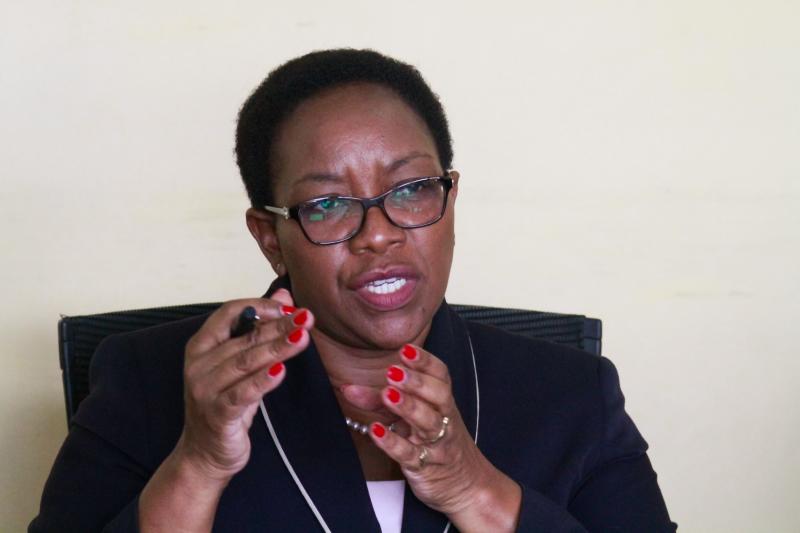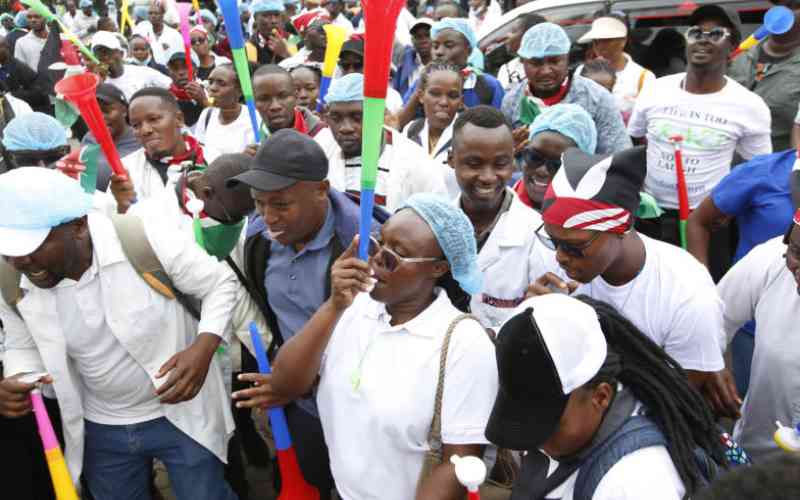
The government plans to turn the Kenyatta University Referral Hospital to a State corporation.
An inter-ministerial committee meeting on Tuesday agreed to turn the facility into a parastatal to be run by a board that would be headed by a Chief Executive Officer.
It will be referred to as Kenyatta University referral hospital. The hospital will be playing in the league of Kenyatta National Hospital and Moi Teaching Referral Hospital in Eldoret.
It is expected the new facility will ease pressure on KNH and allow other learning institutions use it as a learning ground.
The inter-ministerial committee meeting was chaired by Health Cabinet Secretary Sicily Kariuki. CSs Amina Mohamed (Education) and Henry Rotich (Treasury) and officials from Kenyatta University led by the Vice Chancellor Prof Paul Wainaina were also present.
“It was agreed that the hospital be turned into a State corporation for effective running. Other issues will be addressed,” a source aware of the development said.
Prof Wainaina confirmed the plans were underway. "Yes that is true but it is not yet conclusive. We shall release details later," said Prof Wainaina.
According to the plan, board members shall include the VC, the council chairman and the Dean of school of medicine. Chairman of the board will be appointed by the President and there will also be two other members appointed by the Health CS.
It was constructed as a tertiary referral hospital that serves as the teaching hospital of the Kenyatta University Medical School. The public university’s school of medicine has a 600-bed capacity with 21 ICU beds.
The National Assembly Health Committee Chairperson Sabina Chege said her team has made a proposal in the supplementary budget to allow Treasury to give the university some Sh600 million.
"Our committee also made recommendations that if it is the public private partnership that will be adopted then we must know the private partner and the role of the university," said Chege She said the committee is opposed to the idea of making the facility a parastatal. "We do not want another KNH. This facility if well managed will be the best in the region and so we must tread carefully on this," she said.
In the report on the facility the committee wants treasury to allocate Sh625 million for dry run and Sh1 billion for the soft run to the hospital.
“This allocation should be factored in the Supplementary Budget for the National Assembly ratification. This would trigger release of undisbursed loan of Sh1.3 billion for personnel and capacity building,” reads part of the latest report.
The committee also wants the Treasury to amend the on-lending agreement with the university to allow the institution adequate time to reorganise its finances to enable it meet its loan obligations under the on-lending agreement.
The Sabina Chege-led team had visited the institution and expressed shock that the country was spending billions of money in purchasing ICT equipment for county hospitals whereas a fully furnished hospital with the most modern diagnostic and treatment machines was lying unutilised for lack of operating capital.
The development comes at a time when President Uhuru Kenyatta plans to launch the Universal Health Coverage (UHC) pilot programme on December 1.
The UHC pilot will be rolled out in the four counties of Isiolo, Kisumu, Nyeri and Machakos before it is finally scaled up to cover the rest of the country.
The decision was arrived at Tuesday morning when President Uhuru met with the UHC Inter-Governmental Committee at State House, Nairobi.
The committee co-chaired by Health CS and Isiolo Governor Mohammed Kuti briefed the President on their preparations ahead of the pilot programme launch.
The success of the pilot programme in the four counties will give clearance for full-scale role out of UHC ushering in a new era of public health services provision in the country.
Uhuru gave the committee his approval to finalise the launch plans and also come up with respective Memoranda of Understanding (MOUs) between the Ministry of Health and the four counties.
The Head of State encouraged the governors to actively participate in an intensive sensitization exercise in November before the pilot project is launched.
The new UHC package will benefit at least 3.2 million Kenyans in the four pilot counties and is expected to contain a new bouquet of services accessible to Kenyans in public health facilities.
The decision to pilot the programme in the four counties was evidence-based considering their disease burdens.
“Piloting the package in a controlled population ensures less chances of failure and we can minimise the risks when the programme is later scaled up to cover the entire country,” said CS Kariuki in a statement.
 The Standard Group Plc is a multi-media organization with investments in media
platforms spanning newspaper print
operations, television, radio broadcasting, digital and online services. The
Standard Group is recognized as a
leading multi-media house in Kenya with a key influence in matters of national
and international interest.
The Standard Group Plc is a multi-media organization with investments in media
platforms spanning newspaper print
operations, television, radio broadcasting, digital and online services. The
Standard Group is recognized as a
leading multi-media house in Kenya with a key influence in matters of national
and international interest.











